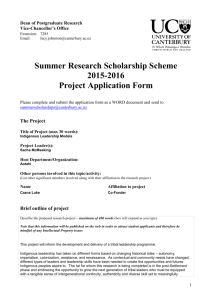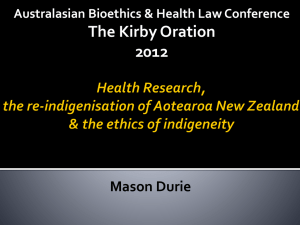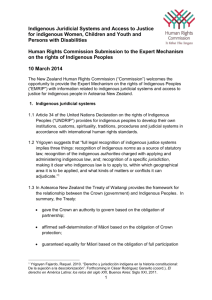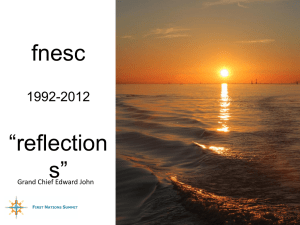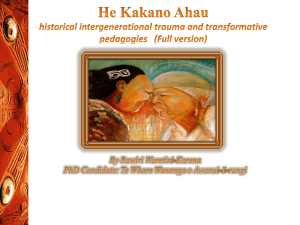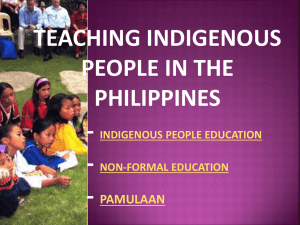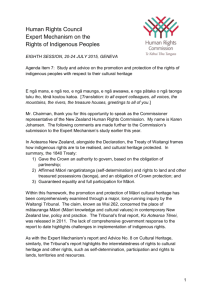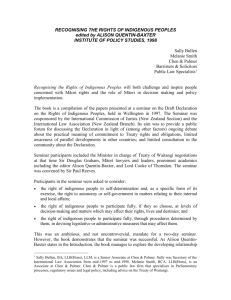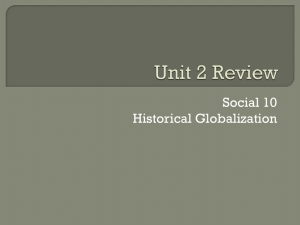Class 1: Course Introduction/ Basic Maori
advertisement
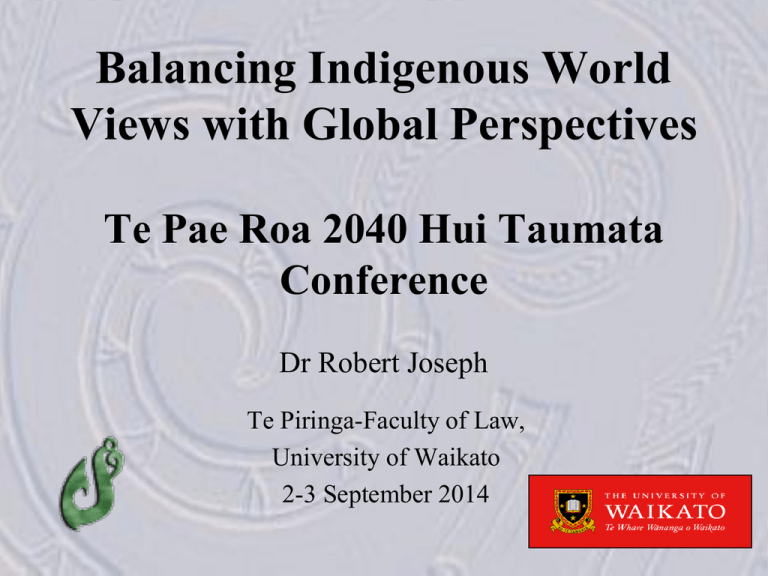
Balancing Indigenous World Views with Global Perspectives Te Pae Roa 2040 Hui Taumata Conference Dr Robert Joseph Te Piringa-Faculty of Law, University of Waikato 2-3 September 2014 Overview • Balancing Indigenous World Views • Indigenous Peoples? • UNDRIP • Ngati Apakura case study • Maori Governance • Challenges Different World Views Indigenous Peoples of the World Who are Indigenous Peoples? • • • • • • • • • • • Geo-politically = the Fourth world 350 million Indigenous Peoples Representing 5,000 cultures and languages Across 70 countries Embody and nurture 80% worlds cultural and biological diversity Occupy 20% world’s land surface Some are majority of population eg Bolivia Others small minorities Recognise common plight and work for selfdetermination based on respect for the earth Share common history and consequences Diverse – From isolated foraging peoples in developing countries – To urbanised communities Inuit of Canada and Siberia Saami of Scandanivia 5 Recent Response from International Community • United Nations Declaration on the Rights of Indigenous Peoples 2007 (UNDRIP) – Drafted over 23+ years – Adopted by the UN General Assembly on 13 September 2007 • 143 countries support • 4 countries opposed: Canada, Australia, New Zealand and the USA (CANZUS States) – Ratified by 1 country – Bolivia – Not a Treaty – so not enforceable, BUT arguably influencing international customary law 7 Good Indigenous Governance Discourse Self-determination – international human rights and Indigenous rights discourse - achieve political, cultural, social, economic development UNDRIP 2007 – Article 3 – right to self-determination – freely determine political status, freely pursue eco, soc, cultural development Article 4 – right to autonomy, selfgovernment re internal and local affairs Ngati Apakura • • • • ‘Golden Age of Maori Development’ Great entrepreneurial tradition Tikanga based Tribe – self-determination - political ,eco, soc, cult development amazing degree Treaty of Waitangi 1840 Māori Early Entrepreneurs “Māori were capable and competitive entrepreneurs who could grow produce and harvest commodities such as flax and timber on a large scale. In this context, the co-operative structure of internal tribal organisation and the system of mutual obligation implied by the custom of utu were distinct assets” (King, 2003, p. 127) Māori Governance – William Rees 1891 AJHR G4, at xviii: ‘When the colony was founded the Natives were already far advanced towards corporative existence. Every tribe was a quasi corporation. It needed only to reduce to law that old system of representative action practiced by the chiefs, and the very safest and easiest mode of corporate dealing could have been obtained. So simple a plan was treated with contempt. The tribal existence was dissolved into its component parts. The work which we have, with so much care, been doing amongst ourselves for centuries, namely the binding together of individuals in corporations, we deliberately undid in our government of the Maoris.’ Early success bolstered by demographic superiority, unfettered access to major resources – land, forests, fisheries and other taonga William Lee Rees 1836-1912 E Pa To Hau – Lament for the Apakura • Rangiamoa cousin to Te Wano • Composed for loss of lands • Pain of the loss • Titiraupenga – Te Wano ill, asked to climb Titiraupenga to view Ngati Apakura rohe • Died, buried there • Enduring reminder generational mamae Te Rohe Pōtae – 1864-1889 • Post-Waikato Wars • Kīngitanga withdrew into King Country • State within a State • Self-government, Parliament, laws, trade, tax system • Home Rule – tikanga Māori • Aukati – international territorial boundary • Any breach – capital offence. • Railway dismantled the system Recent Global Developments • • • • • • Internationalisation Indigenous rights Good governance discourse UNDRIP, Indigenous self-governance - jurisdiction Devolution – Scottish Parliament USA – residual sovereignty Canada – self-government discourse JBNQA, Inuvialuit, Nisga’a, Labrador, Nunavut • Australia – NTA, ILUAs • Pacific Island states • Asia – Malaysia, Philippines, Taiwan, New Guinea Contemporary Māori Society • Degree of old order being restored via Treaty of Waitangi settlements • Treaty settlements offer Māori opportunity and advantage similar to early years • ‘Treaty right’ eg. property - first right of refusal to purchase properties • Forestry – CFRT - licenses • Fisheries – Te Ohu Kaimoana – commercial fisheries right, customary fishing rights - AFL • Tourism – not a Treaty right but unique cultural & intellectual property rights • Good Māori governance vital! • Self-governance jurisdiction? Tuhoe, Whanganui? Contemporary Māori Governance Challenges • • • • • Traditional Transactional Transformational Translational Balanced? Best Defence? • Indigenous and Maori Self-determination & Self-governance Defence? • De Facto – in fact • De Jure – in law • Balance right? • Mana Motuhake responsibility! Creative Potential
